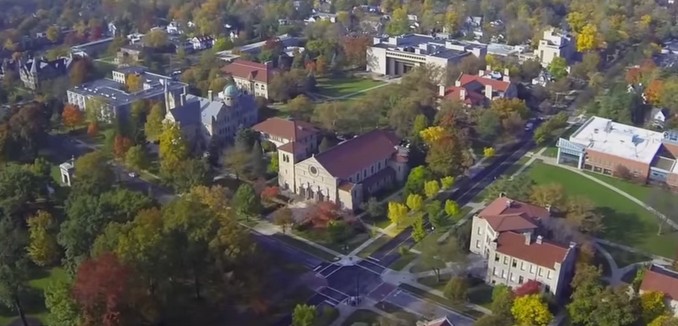The controversy that emerged this spring over Oberlin College’s inaction after The Tower revealed professor Joy Karega’s Facebook posts, which many characterized as anti-Semitic, was only the latest in a series of failures by the college to properly address hostility towards Jews on campus, Tablet reported Tuesday.
The Tower’s scoop that Karega had posted theories that ISIS was a Mossad front, Israel was behind 9/11, and banker Jacob Rothschild controls “your news, the media, your oil, and your government” received national coverage and eventually prompted the school’s board of trustees to condemn the professor. But subsequent reporting revealed that the college administration’s broader failure to address a climate of anti-Semitism over a period of years.
In 2013, as anti-Israel activists were pushing for the student government to pass a resolution supporting the boycott of Israel, a Kosher-Halal coop was expelled from the Oberlin Student Cooperative Association and flyers of swastikas were posted in dorms. Hillel called a meeting of Jewish students to discuss and offer support to each other in the wake of these incidents, but the meeting was crashed by Oberlin’s chapter of Students for a Free Palestine (SFP). Though most of the member of SFP weren’t Jewish, “the students from SFP began interrupting and interrogating us, and the environment turned increasingly hostile,” one student who was at the meeting described, adding that the way SFP hijacked the meeting made the Hillel members feel “violated.”
A widespread belief on campus that all Jews are rich and white even turned Sabbath meals into exercises in marginalization. A student recalled that in September 2013, at the request of a Latina Jewish student, the Oberlin Hillel scheduled a Sabbath dinner featuring Latin American food. Instead of being an opportunity for bridging cultural divides, a Latina student senator demanded on her Facebook page that the dinner be cancelled, because it was perceived to be an example of cultural appropriation.
Oberlin’s Multicultural Resource Center asked the senator to remove her post, but this was not an isolated incident: Flyers for an Asian Fusion Shabbat were defaced, and “Comfort Food Shabbat” brought charges that it was appropriating African-American cooking. “There is a common belief at Oberlin that all Jews are white and rich,” a student observed. “This misconception, which fails to recognize the diversity of the Jewish community (including at Oberlin) leads to the assumption expressed here that Jews are stealing someone else’s culture, when in fact there are Jews who share that culture.” The idea that Jews are exclusively white is not new, an Oberlin alum recounted, noting that in the 1970’s, Sephardic Jews were barred from Students of Color meetings because as Jews they were considered to be white.
Another alum told Tablet that in 2012, the Oberlin Student Cooperative Association voted against providing kosher-for-Passover food for Jewish students. This effort was overruled by cooperative’s nutrition director.
A long-time Oberlin professor noted the systematic bullying of students who “identify Jewishly in any way.” This was shown by the “totalitarian suppression” of speech, with tactics like SFP’s, or simply getting up and walking away from a student who is identifiably Jewish. The professor described the behavior he witnessed as “personalizing persecution of those identified with a position or affiliation.”
The experiences of Jewish students at Oberlin showed “a marriage of deliberate prejudice with empowered ignorance that has increasingly marginalized Jewish students and Jewish life on campus,” Tablet senior writer Yair Rosenberg wrote. For things to improve, the school administration will have to “forthrightly combat misinformed stereotypes about Jews, and to confront anti-Israel activism used as an excuse to intimidate and bully Jewish students.”
Rosenberg’s report is consistent with that of The Daily Beast’s Emily Shire, who interviewed Oberlin students in April. Shire observed that the silence on campus surrounding Karega’s posts “was deafening to some, and especially disconcerting because the silence seemed disproportionately reserved to matters related to Judaism or Israel.”
[Photo: Oberlin College / YouTube ]




